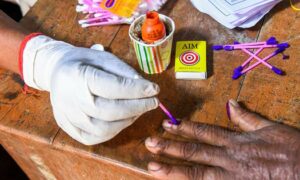
Ghaziabad Juice Shop
Ghaziabad, July 14: In a deeply disturbing incident that has sparked outrage and communal tension, two Muslim men, Zeeshan and Mahtab, were arrested in Ghaziabad, Uttar Pradesh, for allegedly mixing urine in orange juice served to Kanwar Yatra pilgrims. The arrest was made on Sunday, July 13, following a complaint lodged by Bajrang Dal worker Shekhar Sharma.
The duo operated a juice stall at Sihani Chungi, a prominent stop along the Delhi-Meerut Highway, a route frequently used by Kanwar devotees. Police acted promptly and arrested the suspects under Section 151 of the CrPC — a preventive provision used to detain individuals suspected of potentially committing a cognizable offense.
According to ACP Poonam Mishra of Nandgram, the juice samples have been sent to the Food Safety Department for forensic testing. The results are expected within 15 days, and any further legal action will depend on those findings. Meanwhile, the juice shop has been sealed pending investigation.
Allegations and Political Undertones
The complaint alleges a deliberate attempt to target Kanwar pilgrims, an emotionally sensitive claim given the religious and cultural importance of the Kanwar Yatra in northern India. The annual pilgrimage sees millions of Shiva devotees walking hundreds of kilometers to collect holy water from the Ganges, primarily from Haridwar, Gangotri, and Gaumukh.
While investigations are underway, the incident has reignited debates over communal targeting and food safety enforcement. Recently, the Uttar Pradesh government ordered mandatory QR code stickers for all shops along the 540-km Kanwar route — a move criticized by some as a discriminatory measure targeting Muslim-owned establishments. Officials, however, maintain the initiative is meant to promote hygiene, transparency, and accountability for the four crore Kanwar pilgrims expected this season.
The gravity of the current allegation and the communal fault lines it touches demand a swift and impartial investigation. Authorities have urged citizens and media outlets to avoid speculation and wait for forensic results before drawing conclusions.
Opinion: Let the Law Speak, Not Prejudice
The recent incident in Ghaziabad—where two Muslim men were arrested over allegations of mixing urine in orange juice served to Kanwar Yatra pilgrims—has quickly ignited public outrage, communal whispers, and polarized commentary. But before rushing to conclusions, we must take a step back and allow facts and due process to guide the narrative, not assumptions shaped by identity.
It is vital to understand that the arrests were made under Section 151 of CrPC, a preventive provision, not a conviction or even formal charges based on conclusive evidence. The forensic results of the juice samples are still pending, and until those arrive, no guilt should be presumed.
What’s troubling, however, is how quickly this case has taken a communal turn. Allegations—even in their raw, unverified form—are being portrayed as a deliberate, religiously motivated act. If the evidence eventually proves these men innocent, the damage to community trust, personal lives, and public harmony may already be irreversible.
Moreover, this incident must not be used to justify blanket suspicion or regulatory overreach targeting businesses owned by a particular community. The state’s recent QR code mandate for Kanwar route vendors is being interpreted by many as a veiled form of profiling, which can erode the idea of equal citizenship and deepen existing divisions.
The Kanwar Yatra is sacred to millions, and any attack—real or imagined—on its sanctity must be treated with seriousness. But equally sacred is the principle of justice that does not waver under mob pressure or religious bias.
Let’s allow the courts and experts to investigate thoroughly. If guilt is proven, punishment must follow. But if not, we must be prepared to offer not just legal relief, but a collective apology for allowing fear and communal narratives to overpower fairness.
— Naveed Uddin Khan Uzair
Opinion Contributor, Crime Today News
Further updates will follow as the investigation progresses.
This article is published by Crime Today News ©






